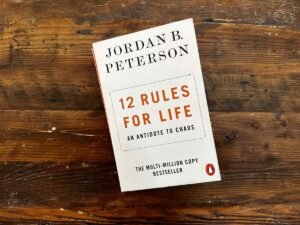12 Rules for Life by Jordan B. Peterson
Life Advice at the Intersection of Psychology, Myth & Personal Responsibility
 What This Book Is
What This Book Is
First published in 2018, 12 Rules for Life: An Antidote to Chaos is a bestselling self-help book by Canadian psychologist Jordan B. Peterson. It delivers a fusion of psychological research, ancient stories, personal anecdotes, and ethical guidance—structured around twelve pragmatic life “rules” that help navigate meaning amidst life’s inherent suffering (Wikipedia).
The 12 Rules Summarized
Peterson’s chapters each focus on a specific rule, including:
- Stand up straight with your shoulders back
- Treat yourself like someone you are responsible for helping
- Make friends with people who want the best for you
- Compare yourself to who you were yesterday…
- Set your house in perfect order before criticizing the world
- Pursue what is meaningful, not what is expedient
- Tell the truth—or at least don’t lie
- Assume the person you are listening to knows something you don’t
- Be precise in your speech
- Don’t bother children when they are skateboarding
- Pet a cat when you encounter one on the street
These rules blend mundane habits with profound philosophical guidance, each anchored by stories and insights from philosophy, neuroscience, religion, and mythology.
Thematic Depth & Psychological Insight
- Responsibility over Victimhood:
Rule 1 (“Stand up straight”) uses lobster dominance hierarchies to illustrate that posture and self-respect influence how the world treats you—and how you treat yourself. - Truth & Clarity:
Peterson argues that precision in speech and honesty lay the groundwork for solid relationships and constructive living—Rule 7 and Rule 9 ask us not to hide fragments of ourselves. - Meaning as Antidote to Chaos:
Central to the book is Peterson’s belief that meaning (not happiness) keeps despair at bay. Rule 6 encourages pursuing the meaningful, even when difficult. - Cultural Myths & Human Nature:
Drawing on biblical stories like Adam & Eve and Pinocchio’s journey, Peterson explores humanity’s existential challenges—raising young men, moral courage, and standing against malevolent forces.
👍 Praise & Criticism
What Readers Appreciate:
- A heartfelt, mentor-like approach paired with evidence-based thinking.
- Combines academic rigor with relatable, real-life examples to promote purposeful living.
- Empowers young adults and struggling readers to reclaim agency and personal order.
Critiques to Consider:
- Some perceive the tone as preachy or overly aggressive (The Guardian).
- Others argue the philosophical and mythic layering sometimes overshadows actionable clarity.
- A reddit user commented:
“It’s pretty technically written… if it’s your first read in self-development… you might start elsewhere.” (Reddit)
🎯 Who Should Read It
- Young adults seeking structure and accountability in an unpredictable world.
- Anyone drawn to meaning over comfort, willing to face hardship head-on.
- Readers fascinated by the intersection of psychology, mythology, and personal growth.
👣 Practical Takeaways
- Adopt responsibility: apply Rule 1 by adjusting posture and stance—but also take accountability for your path.
- Cultivate clarity: aim to speak with precision and integrity—Rule 9 and 7.
- Seek meaning: commit to a cause or purpose that transcends momentary satisfaction—Rule 6.
- Discover beauty in small moments: persevere through chaos; when challenges overwhelm, remember to “pet the cat” (Rule 12)—finding solace even on difficult days (The New Yorker).
🏁 Final Thoughts & Call to Action
12 Rules for Life is not fluff—it’s a structured conscience-check, grounded in narratives drawn from psychology, religion, and myth. It’s about building order from chaos, embracing discomfort, and speaking your truth.
➡️ Ready to stand a little taller? Start with one rule—maybe “set your house in perfect order”—and share which one resonates with your journey in the comments below.